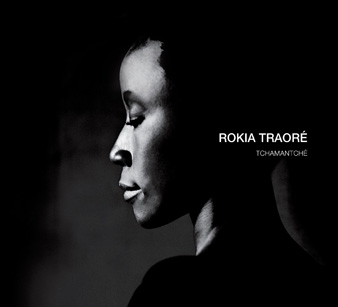Rokia Traoré's Tchamantché hits stores worldwide tomorrow after its European release late last year led to its inclusion in many critics' year-end best lists. The New York Times picks the album for this week's Critics' Choice, crediting Rokia for "creating her own radically delicate fusions" and calling the album her best, with music that "carries the plucked modal patterns of Malian tradition toward contemplation and intimacy." The Canadian Press calls it "a quiet, subdued album whose genius lies in each song's arrangement, the combination of modern and traditional elements and the intensity of Rokia Traoré's voice ... It's an album you'll want to maintain in a prominent place among your music collection." The Scripps Howard News Service gives it four stars and says the power of her music comes not from belting out but from "her persuasive use of subtlety ... the power of understatement."
Rokia Traoré's new album, Tchamantché, hits stores worldwide tomorrow after its European release late last year led to the album's inclusion in many critics' year-end best lists. The New York Times's Jon Pareles picks the album for the Times's Critics' Choice among this week's new CDs.
"In its traditional roles as historical chronicle and community conscience, West African music doesn’t favor introspection," says Pareles. "That’s what makes the Malian songwriter and singer Rokia Traoré such a graceful exception." Rokia, he writes, "is creating her own radically delicate fusions."
Pareles describes Tchamantché as Rokia's "fourth and best album," with music that "carries the plucked modal patterns of Malian tradition toward contemplation and intimacy." With few directly overt calls to action in the songs' lyrics, Rokia's "music itself," says Pareles, is "carrying the public pronouncements of so much African music into new, private realms."
Read the review at nytimes.com.
---
The Canadian Press calls Tchamantché "a quiet, subdued album whose genius lies in each song's arrangement, the combination of modern and traditional elements and the intensity of Rokia Traoré's voice. Part griot and part chanteuse, Traoré's voice trembles and whispers among a sparse rhythm section and traditional African instruments on the well-crafted tracks."
In its discussion of the new album, the review references its predecessor, 2004's Bowmboï, as an another album "on which the Malian artist again showed a deft touch for arranging when she collaborated with the American string ensemble The Kronos Quartet."
On Tchamantché , concludes the review, the "mix of tender and danceable tunes, and African and Western musical sensibilities create a delicate balance. It's an album you'll want to maintain in a prominent place among your music collection."
Read the full review here.
---
The Knoxville News-Sentinel's Chuck Campbell, reviewing the record for the Scripps Howard News Service, gives Tchamantché four stars and says the power of her music comes not from belting out but from "her persuasive use of subtlety ... the power of understatement," and on the new album in particular "typically using trembling inflections to convey emotion rather than high-pitched grandstanding."
Campbell cites songs like "the long-smoldering epic opener" for feeling "both delicate and weighty as all the layers meld together into a mesmerizing drone," others through which the album "allures with spacious softer cuts," and still others through which Traoré "deftly leads the complex interplay of instruments and frenetic vocals ... her preternatural and soulful delivery trumping all dissenting nuance."
Read more at scrippsnews.com.
- Log in to post comments



